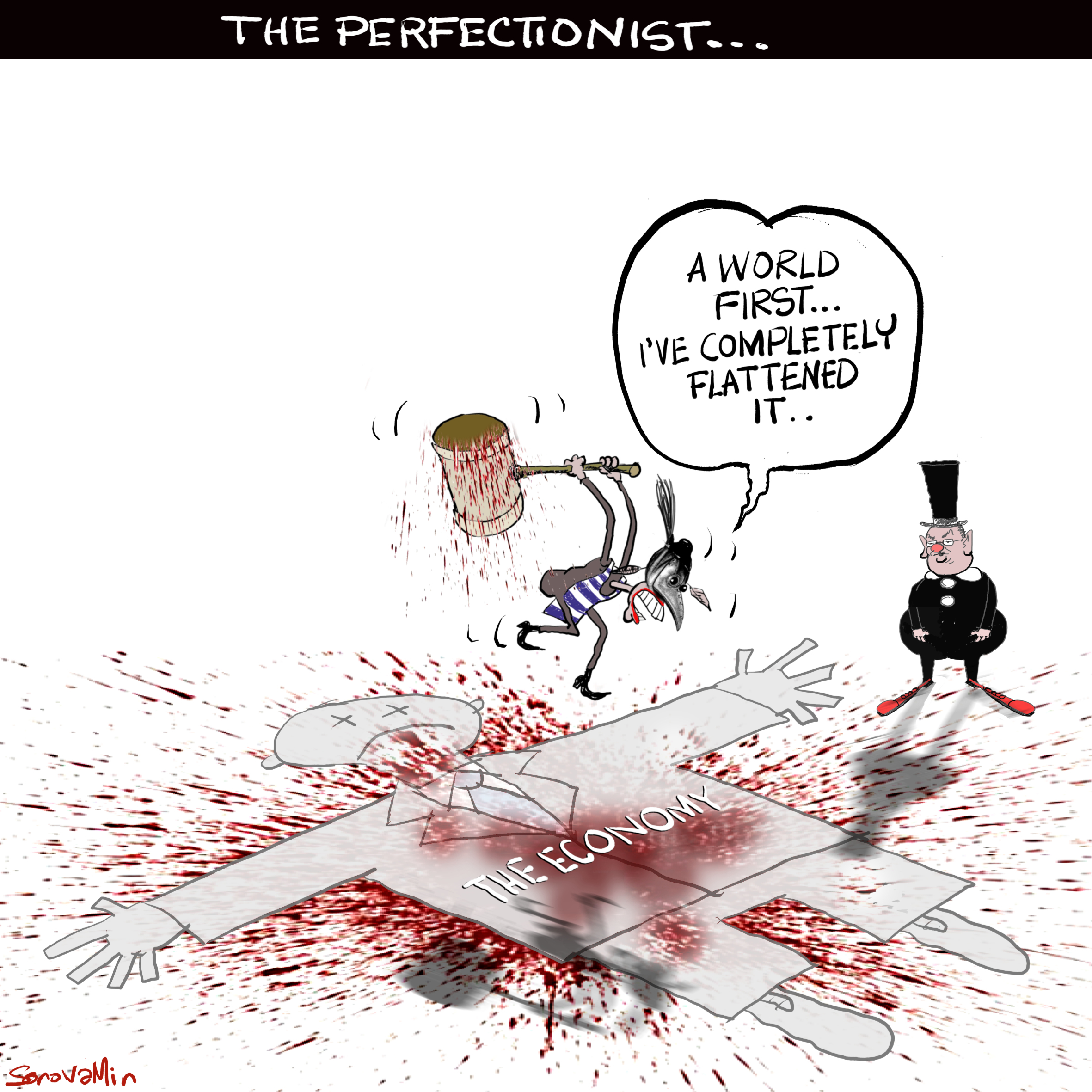Table of Contents
Source: Facebook
The problem with times of crisis is that political bias clouds objectivity. Pragmatism is lost and support and opposition become personal, not logical.
Traditional Labour supporters will support Labour policies or actions and oppose National policies regardless of the situation and this is reciprocated by National supporters when Labour policies are under scrutiny.
To be supportive of the government of the day somehow implicitly requires you to be a supporter of the party in general and with that, ALL of its policies and decisions. The relationship is inversely assumed when you are critical of actions or policies of that government in that it is assumed that you support the opposition. Therein lies the problem with most debate when politics is involved. Supporters support absolutely and blindly and opposers oppose similarly.
Jacinda Ardern’s government took power in October 2017 after three terms of National government. New Zealand had lost some faith in the National government’s ability to deliver on economic promises without selling off state owned assets and agricultural land, and worried about cultural dilution thanks to years of unbridled immigration largely from mainland China. We won’t even start on the pointless and costly flag referendum debacle.
Nevertheless, National gained a plurality at the last election which was subsequently swung by Winston Peters of NZ First. It was a shambles but there was hope in the new Prime Minister: a young woman at a time when women in leadership were a huge and growing trend and very marketable.
Ardern’s government did nothing of note bar some posturing and virtue signalling until the 15th of March 2019 when an Australian, having exploited our weak firearms licence vetting, acquired several semi-automatic rifles, shotguns and thousands of rounds of ammunition and opened fire on worshippers at a Christchurch mosque.
Ardern’s opportunity to be seen to make a difference had come. Without time for research or consideration, an amendment to the firearms legislation was rushed through, banning all but small calibre semi-automatic rifles and all repeating shotguns with a detachable magazine or a tube magazine with a capacity over five rounds. The select committee in charge had no knowledge, understanding or appreciation of the sport of shooting or hunting and dismissed all opposing submissions made by experts.
$139+ million in tax payers’ money was spent pointlessly buying these firearms back off law abiding citizens. Other than alienating an estimated 10% of the population and harming a few related businesses, the new legislation did nothing to increase safety or remove such firearms from criminals. Typical of journalists, the world media responded praising Ardern for taking action, regardless of whether it had helped in any way. Media are well known for failing to make the distinction between activity and results.
Ardern received more international media praise in December 2019 for her reported response to the volcanic eruption on White Island. Her supporters went to social media to voice their appreciation for their PM expressing sympathy.
National supporters had nothing to say, for or against, as Ardern had done nothing of any material value at all.
On the 30th of December 2019, China finally had to admit that it had released an infectious zoonotic virus which had been allowed to spread to numerous other countries despite China stopping all domestic travel. Ardern’s government was advised to close the border to anyone but New Zealand citizens and permanent residents and to quarantine all arrivals. Ardern was busy discussing trivial trade matters in Fiji at the time despite calls from opposition MPs to return to face the unfolding crisis.
Travellers were told to self isolate some time later; however, many didn’t and some actively stated that they would not. Nothing of any purpose happened until New Zealand had cases of community transmission so at 11:59 pm on the 25th of March 2020 we as a nation were subjected to “lockdown” under COVID-19 alert level 4.
Not only were we told we had to stay home and only access essential services and shops, we were told that police would take action if we didn’t. We were even told that we could face charges. Many questioned the extreme reactive measures taken to combat a virus that had such a low death rate but Ardern led the people of New Zealand to believe that there were only two options: to do nothing at all and let the virus spread or to close the entire country down, destroy small businesses and cripple the economy.
Supermarkets were to remain open which inadvertently served as a focal gathering point of shoppers of all kinds to potentially spread the virus but amazingly, small businesses like greengrocers and family owned butchers and bakeries were ordered closed despite qualifying as essential business and having plans to keep shoppers physically distanced. Many have remained closed and will never reopen. Hindsight is a wonderful thing but what’s also wonderful is the advice of experts. The only issue is, you have to actually take that advice instead of dismissing it in favour of what suits your narrative.
Each day we would be graced by the PM, and Director General of Health Dr Ashley Bloomfield, to update us on new and recovered cases. Confusingly, the statistics were fudged to record deaths with the virus, not just deaths as a result of the virus. Mass hysteria ensued. We were told of the probability that tens if not hundreds of thousands of New Zealanders could die. The most often used propaganda was this: “we went hard and we went early”. This was repeated daily until many had forgotten about the government’s failure to close the border early and the failure to quarantine arrivals.
The world media responded with praise when it appeared that our PM, on her own, had flattened the curve. Ardern was happy to bask in the world media adulation after announcing she and others would take a 20% pay cut in response to pressure from opposition MPs; however, a month later, no pay cut was taken. The government even blocked a law change to allow for the pay cuts but this was not widely reported as the PM was doing a great job of controlling the narrative.
Many New Zealanders had worked out that the lockdown was in fact outside of the scope of any New Zealand legislation but in a collective effort to curb the spread of the virus, we still largely remained home. This was to the credit of New Zealanders, not the government, as opposed to what was widely reported.
This was a tipping point, however, as Ardern’s praise from the world media had gone to her head. Her pretence at leadership and false promises of a pay cut as a show of solidarity had gone unchecked; perspective and proportionality had been lost in favour of ego and the search for further political recognition. “I’m a perfectionist,” claimed Ardern. In which respect, other than total annihilation of the economy, is unclear.
Ardern’s government may well have saved the lives of a few very elderly, already on their deathbeds, but the subsequent cost to New Zealand is going to be catastrophic. If this challenges what you think, read the statistics, not just what the government and the media push out en masse.
We remained in lockdown, businesses failed, mortgages went into default, people started asking questions and the PM started dismissing them with glib, childish remarks. When questioned in an interview by Duncan Garner on just how long economic restrictions could affect New Zealand and whether the “new normal” could go on for months and months, Ardern dismissed the question entirely, responding “I didn’t realise you were an epidemiologist, congratulations on your new qualification”, a particularly immature and cocky side step to a legitimate question.
After Crown law experts found that the lockdown was in fact unlawful, the PM’s office deceptively released advisory documents showing government’s deliberate errors late on a Friday afternoon after most people, particularly journalists had finished work and were in weekend mode, thereby remaining largely under the radar.
Realising the public had discovered that the conditions of the lockdown had been unlawful, Ardern’s government rushed through a new Bill affording police sweeping powers to strip basic, fundamental human rights from every New Zealander and, concerningly, provisions for police to enter a private premises without a warrant.
Police can’t even enter gang properties even on suspicion of serious crime but if a household was suspected of having more than 10 people on site, police or “authorised persons” could enter and search with impunity.
Even the Human Rights Commissioner voiced serious concern publicly but Ardern’s government dismissed his concerns completely. Her office, in an attempt to curb a public relations nightmare, warned ministers and party members to flatly dismiss any questions regarding the lawfulness of the level 4 lockdown or the new unscrutinised legislation as if the public were better off not knowing. Or at least the government would be better off if the public didn’t know. The government were marking their own homework and writing their own reports. The media were printing whatever would sell and this meant blind, absolute support for the PM. Nothing was without heavy bias and the public believed it.

The curve was flattened long ago, much like the economy. While the virus was proven to be fatal only to the very elderly and those with preexisting health conditions, the state of the economy and the dangerous new legislation is going to have a heavy impact on every single New Zealander, their children and their grandchildren.
We were led to believe it was a matter of the safety of the people vs the economy, assuming that the economy had no effect on the lives of New Zealanders. People started talking about the economy as if it were irrelevant until it started affecting them. Jobs were lost and realities hit home.
The propaganda through which Ardern’s government has deceived and coerced the population has been effective on many. To every call for accountability, we hear “she’s doing a fantastic job”, “we could be like Italy or America if we hadn’t”, “would you rather hundreds of thousands died?” “who cares about the economy if we’re all dead”, none of which can be backed up with any evidence; but such is the power of propaganda. Often the response to scepticism or criticism was simply “what rubbish”, not explained or justified any further. It was blind dismissal of anything challenging the government’s own narrative.
At best, the massively costly decisions made by Jacinda Ardern’s government can be seen as wilfully negligent, power hungry and dangerously incompetent. At worst, the biggest national debt and tax funded promotional election campaign in history, and still, no one has been held to account.

If you enjoyed this BFD article please consider sharing it with your friends.









